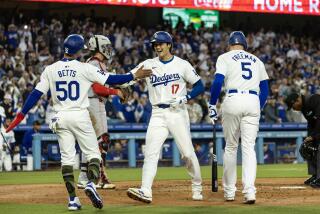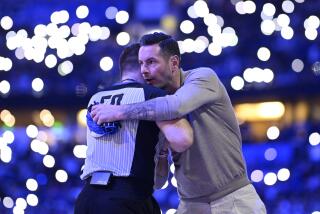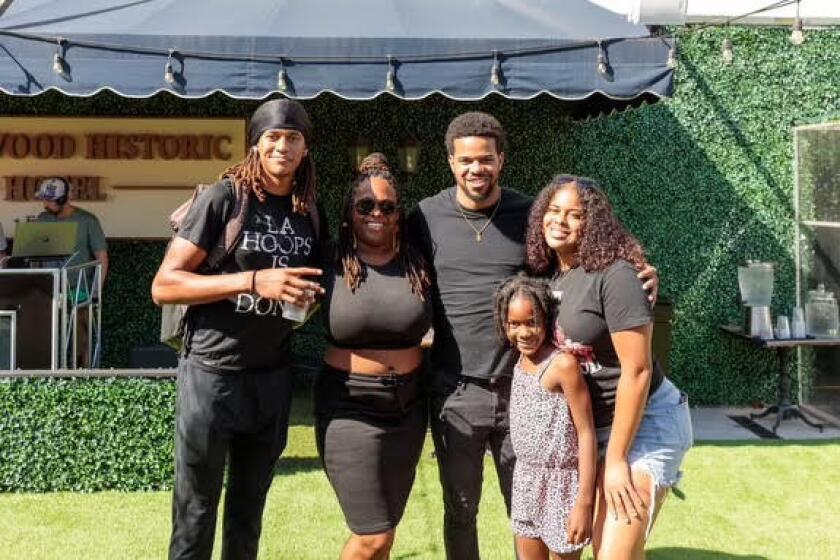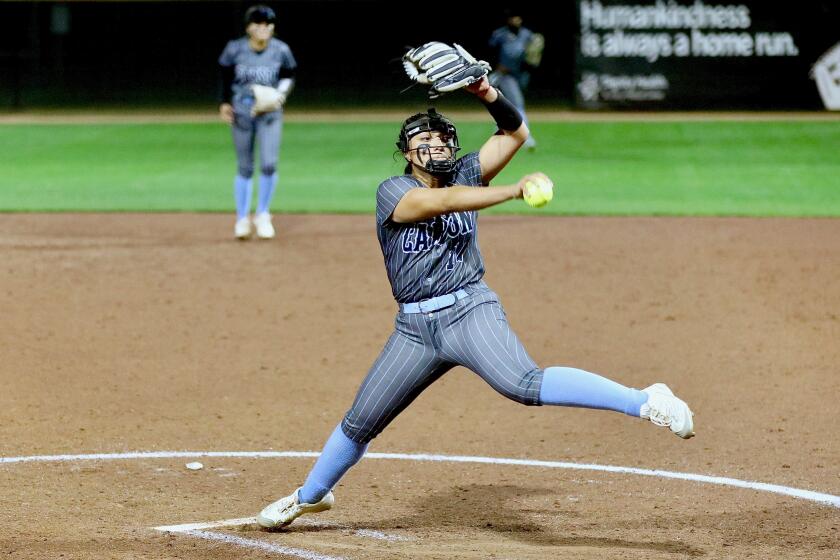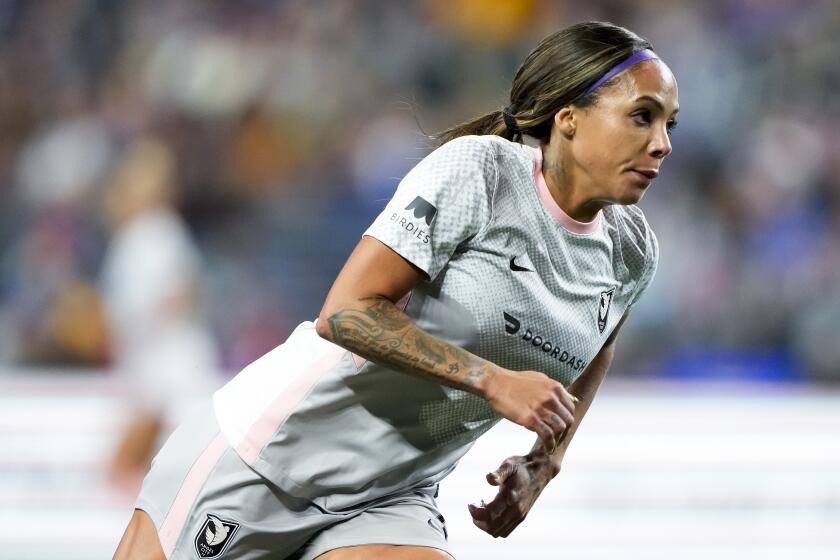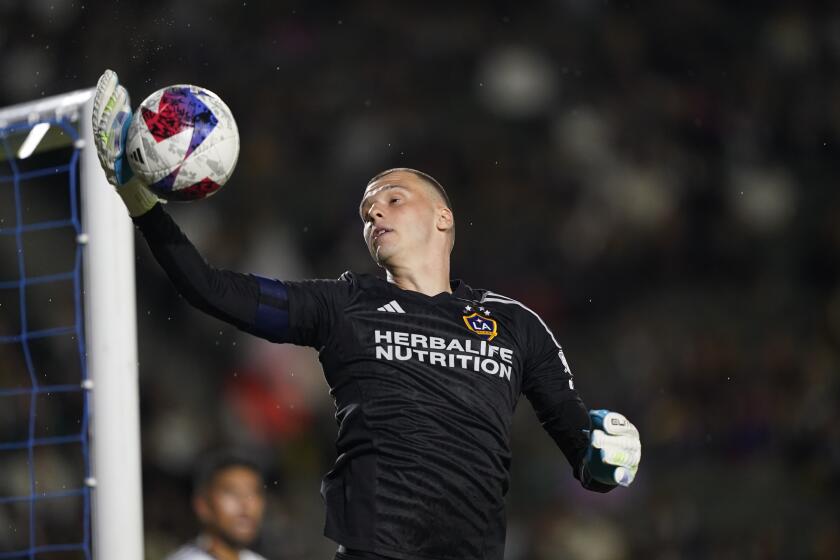COLLEGE FOOTBALL : Stanford Musters One-Sided Victory Over Cal in the Big Game
The Big Game ended, fittingly, with a sack of California’s interim quarterback, Brad Howe.
It was that kind of a game as a swarming Stanford defense and an offense led by Brad Muster combined to bury California, 31-7, in one of the most lopsided games in the 90 years the teams have met on the football field.
Not since 1930, when Stanford won, 41-0, has the Cardinal dominated its across-the-bay rival.
Muster, who has almost made a career out of tormenting the Bears, had one of his most prolific days in closing out four years with the Cardinal. The 6-foot 3-inch, 226-pound running back from Novato, Calif., gained 90 yards rushing in 22 carries and caught 7 passes for another 56 yards.
It wasn’t quite up to his freshman Big Game performance, when he gained 204 yards in 34 carries, but it was enough to keep the Bears out of a game that had little meaning except for pride.
With the win--in front of 85,000 fans on a cool, crisp day in Stanford Stadium--the Cardinal finished 5-6, while the Bears dropped to 3-6-1 with Washington State left next Saturday in Tokyo.
“It was a great way to end the season,” said Muster, who was touted as a Heisman Trophy candidate before he injured his ankle on the opening day of practice and missed five games.
“I wish we could start the season all over again right now. I am going to take my future one day at a time from here and hope my ankle holds up.”
Muster is expected to go high in the National Football League draft.
“Everyone in this business is trying to get good football players, but they’re a rare breed,” said Raiders scout Ron Wolf, who has been bird-dogging Muster. “Brad is one of them. He has a great ability to catch the ball and finding the open spot on the line.”
On several occasions, including his 15-yard run for Stanford’s third touchdown, Muster displayed remarkable open-field presence in leaving would-be Bear defenders grasping nothing but air as he ran by them.
“I’m thrilled that (Muster) ended his career this way,” Stanford Coach Jack Elway said. “It was obviously frustrating for him this season, but he is just a tremendous player. Players like Brad do not come along very often. For me, this was a dream come true that he had this type of a game.”
Even first year Cal Coach Bruce Snyder got caught up in the Muster-watching.
“He’s just a heck of a great player,” said Snyder, who sought out the Stanford senior after the game to congratulate him.
Although Muster and several other Cardinal sparkled individually, it was a team win. Stanford had the ball for 73 plays and more than 36 minutes to only 54 plays in 23 minutes for California.
“One thing we didn’t have was very many snaps,” Snyder lamented. “When you have the ball for so few plays, it’s hard to get anything going. We couldn’t get momentum in the second half.”
After the two teams sparred through most of the first quarter, Stanford scored first on the day’s most spectacular play, an 82-yard pass and run from quarterback Brian Johnson to freshman wide receiver Walter Batson. It was the longest scoring pass play in Big Game history.
Batson took the ball in full stride just behind the center of the line, but when he found daylight, he simply outran a bevy of Bear defenders.
“It was a short pass route,” said Johnson, from Skyline High in Oakland. “My object was just to let the play develop and get the ball to Walter. I just hope I’m in the same position next year.”
Johnson is a red-shirt freshman who didn’t start until the fifth game, but he did a solid job. He completed 14 of 21 passes for 205 yards with 1 interception.
California retaliated with its lone score, a well- executed 87-yard drive in 13 plays. Tailback Chris Richards did most of the damage with runs of 17 and 12 yards and also got the final 2 yards when he took off on a running dive that barely reached the goal line.
Stanford took a 10-7 lead into the dressing room at halftime after David Sweeney kicked a 37-yard field goal. The score was set up by a 29-yard shank by California punter Scott Tabor, who was the nation’s third-leading punter going into the game.
In a battle between two of college football’s top punters, Stanford’s Doug Robison had the edge. Robinson averaged 49 yards in 3 kicks, while Tabor was 40.2 in 7 tries.
Even though the score was only 10-7, Stanford dominated with 218 yards to 151, and the second half was no contest.
As soon as it got the ball after holding the Bears in four downs, Stanford drove 59 yards to score on Johnson’s 1-yard quarterback sneak. The big plays were a 13-yard run off right tackle by Marshall Dillard and an 11-yard pass from Johnson to Muster.
Still in the third period, Stanford began another drive, highlighted by Johnson’s 16-yard pass to Ed McCaffrey, that ended on the third play of the fourth quarter with Muster’s 15-yard run.
A double penalty, which moved Stanford from the Bear 38 to the 9-yard line, set up the Cardinal’s final touchdown. California linebacker David Ortega, the defensive standout of the day, was so unhappy with a holding call against his team that he argued with the referee, then kicked the penalty flag--drawing another penalty.
Ortega made 22 tackles and had the Bears’ only interception.
Three plays after the penalty, Muster moved the ball to the two and Jon Volpe ran it in. Sweeney’s fourth extra point made it 31-7.
Howe, a senior from Santa Barbara who was starting his first game at quarterback for the Bears after Troy Taylor was injured last week, completed 11 of 22 passes but none were scoring threats.
“Taylor’s absence had to have an effect on them,” Elway said. “It was obviously a blow to them. We faced an unknown prior to the game, but our plan was to limit the big play. I think we did a good job of that.”
More to Read
Get our high school sports newsletter
Prep Rally is devoted to the SoCal high school sports experience, bringing you scores, stories and a behind-the-scenes look at what makes prep sports so popular.
You may occasionally receive promotional content from the Los Angeles Times.
